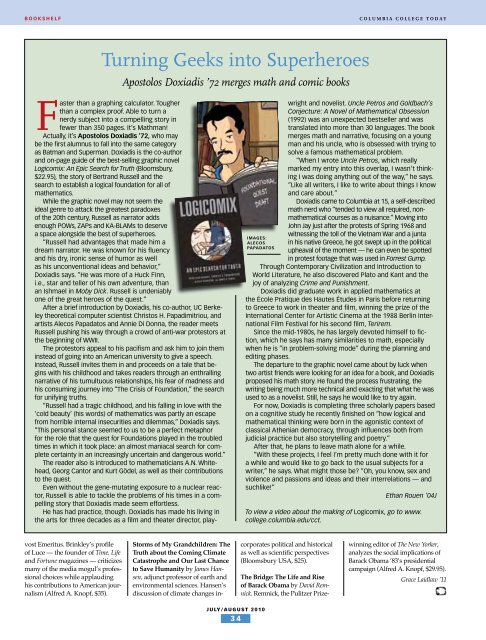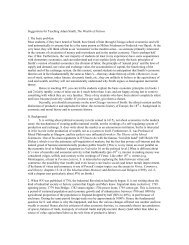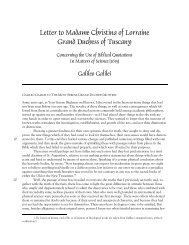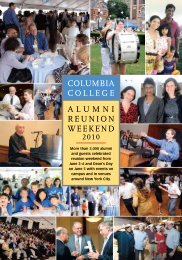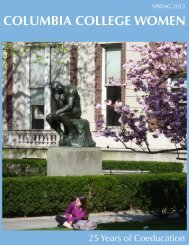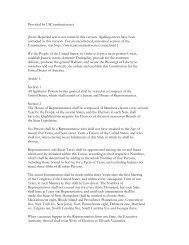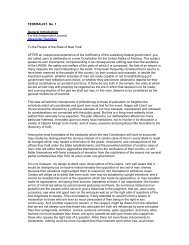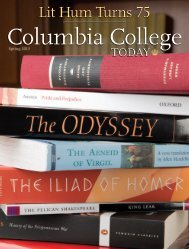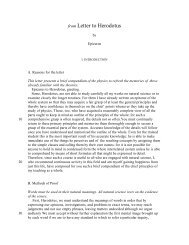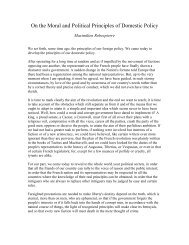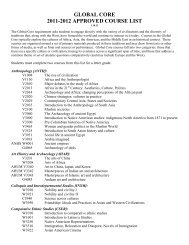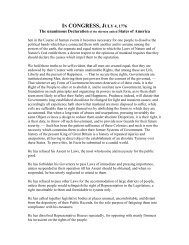Congratulations, Class of 2010! - Columbia College - Columbia ...
Congratulations, Class of 2010! - Columbia College - Columbia ...
Congratulations, Class of 2010! - Columbia College - Columbia ...
You also want an ePaper? Increase the reach of your titles
YUMPU automatically turns print PDFs into web optimized ePapers that Google loves.
ookshelf<br />
columbia college today<br />
Turning Geeks into Superheroes<br />
Apostolos Doxiadis ’72 merges math and comic books<br />
Faster than a graphing calculator. Tougher<br />
than a complex pro<strong>of</strong>. Able to turn a<br />
nerdy subject into a compelling story in<br />
fewer than 350 pages. It’s Mathman!<br />
Actually, it’s Apostolos Doxiadis ’72, who may<br />
be the first alumnus to fall into the same category<br />
as Batman and Superman. Doxiadis is the co-author<br />
and on-page guide <strong>of</strong> the best-selling graphic novel<br />
Logicomix: An Epic Search for Truth (Bloomsbury,<br />
$22.95), the story <strong>of</strong> Bertrand Russell and the<br />
search to establish a logical foundation for all <strong>of</strong><br />
mathematics.<br />
While the graphic novel may not seem the<br />
ideal genre to attack the greatest paradoxes<br />
<strong>of</strong> the 20th century, Russell as narrator adds<br />
enough POWs, ZAPs and KA-BLAMs to deserve<br />
a space alongside the best <strong>of</strong> superheroes.<br />
“Russell had advantages that made him a<br />
dream narrator. He was known for his fluency<br />
and his dry, ironic sense <strong>of</strong> humor as well<br />
as his unconventional ideas and behavior,”<br />
Doxiadis says. “He was more <strong>of</strong> a Huck Finn,<br />
i.e., star and teller <strong>of</strong> his own adventure, than<br />
an Ishmael in Moby Dick. Russell is undeniably<br />
one <strong>of</strong> the great heroes <strong>of</strong> the quest.”<br />
After a brief introduction by Doxiadis, his co-author, UC Berk e-<br />
ley theoretical computer scientist Christos H. Papadimitriou, and<br />
artists Alecos Papadatos and Annie Di Donna, the reader meets<br />
Russell pushing his way through a crowd <strong>of</strong> anti-war protestors at<br />
the beginning <strong>of</strong> WWII.<br />
The protestors appeal to his pacifism and ask him to join them<br />
instead <strong>of</strong> going into an American university to give a speech.<br />
Instead, Russell invites them in and proceeds on a tale that begins<br />
with his childhood and takes readers through an enthralling<br />
narrative <strong>of</strong> his tumultuous relationships, his fear <strong>of</strong> madness and<br />
his consuming journey into “The Crisis <strong>of</strong> Foundation,” the search<br />
for unifying truths.<br />
“Russell had a tragic childhood, and his falling in love with the<br />
‘cold beauty’ (his words) <strong>of</strong> mathematics was partly an escape<br />
from horrible internal insecurities and dilemmas,” Doxiadis says.<br />
“This personal stance seemed to us to be a perfect metaphor<br />
for the role that the quest for Foundations played in the troubled<br />
times in which it took place: an almost maniacal search for complete<br />
certainty in an increasingly uncertain and dangerous world.”<br />
The reader also is introduced to mathematicians A.N. Whitehead,<br />
Georg Cantor and Kurt Gödel, as well as their contributions<br />
to the quest.<br />
Even without the gene-mutating exposure to a nuclear reactor,<br />
Russell is able to tackle the problems <strong>of</strong> his times in a compelling<br />
story that Doxiadis made seem effortless.<br />
He has had practice, though. Doxiadis has made his living in<br />
the arts for three decades as a film and theater director, playwright<br />
and novelist. Uncle Petros and Goldbach’s<br />
Conjecture: A Novel <strong>of</strong> Mathematical Obsession<br />
(1992) was an unexpected bestseller and was<br />
translated into more than 30 languages. The book<br />
merges math and narrative, focusing on a young<br />
man and his uncle, who is obsessed with trying to<br />
solve a famous mathematical problem.<br />
“When I wrote Uncle Petros, which really<br />
marked my entry into this overlap, I wasn’t thinking<br />
I was doing anything out <strong>of</strong> the way,” he says.<br />
“Like all writers, I like to write about things I know<br />
and care about.”<br />
Doxiadis came to <strong>Columbia</strong> at 15, a self-described<br />
math nerd who “tended to view all required, nonmathematical<br />
courses as a nuisance.” Moving into<br />
John Jay just after the protests <strong>of</strong> Spring 1968 and<br />
witnessing the toll <strong>of</strong> the Vietnam War and a junta<br />
in his native Greece, he got swept up in the political<br />
upheaval <strong>of</strong> the moment — he can even be spotted<br />
in protest footage that was used in Forrest Gump.<br />
Through Contemporary Civilization and Introduction to<br />
World Literature, he also discovered Plato and Kant and the<br />
joy <strong>of</strong> analyzing Crime and Punishment.<br />
Doxiadis did graduate work in applied mathematics at<br />
images:<br />
Alecos<br />
Papadatos<br />
the École Pratique des Hautes Études in Paris before returning<br />
to Greece to work in theater and film, winning the prize <strong>of</strong> the<br />
International Center for Artistic Cinema at the 1988 Berlin International<br />
Film Festival for his second film, Terirem.<br />
Since the mid-1980s, he has largely devoted himself to fiction,<br />
which he says has many similarities to math, especially<br />
when he is “in problem-solving mode” during the planning and<br />
editing phases.<br />
The departure to the graphic novel came about by luck when<br />
two artist friends were looking for an idea for a book, and Doxiadis<br />
proposed his math story. He found the process frustrating, the<br />
writing being much more technical and exacting that what he was<br />
used to as a novelist. Still, he says he would like to try again.<br />
For now, Doxiadis is completing three scholarly papers based<br />
on a cognitive study he recently finished on “how logical and<br />
mathematical thinking were born in the agonistic context <strong>of</strong><br />
classical Athenian democracy, through influences both from<br />
judicial practice but also storytelling and poetry.”<br />
After that, he plans to leave math alone for a while.<br />
“With these projects, I feel I’m pretty much done with it for<br />
a while and would like to go back to the usual subjects for a<br />
writer,” he says. What might those be “Oh, you know, sex and<br />
violence and passions and ideas and their interrelations — and<br />
suchlike!”<br />
Ethan Rouen ’04J<br />
To view a video about the making <strong>of</strong> Logicomix, go to www.<br />
college.columbia.edu/cct.<br />
vost Emeritus. Brinkley’s pr<strong>of</strong>ile<br />
<strong>of</strong> Luce — the founder <strong>of</strong> Time, Life<br />
and Fortune magazines — criticizes<br />
many <strong>of</strong> the media mogul’s pr<strong>of</strong>essional<br />
choices while applauding<br />
his contributions to American journalism<br />
(Alfred A. Knopf, $35).<br />
Storms <strong>of</strong> My Grandchildren: The<br />
Truth about the Coming Climate<br />
Catastrophe and Our Last Chance<br />
to Save Humanity by James Hansen,<br />
adjunct pr<strong>of</strong>essor <strong>of</strong> earth and<br />
environmental sciences. Hansen’s<br />
discussion <strong>of</strong> climate changes incorporates<br />
political and historical<br />
as well as scientific perspectives<br />
(Bloomsbury USA, $25).<br />
The Bridge: The Life and Rise<br />
<strong>of</strong> Barack Obama by David Remnick.<br />
Remnick, the Pulitzer Prizewinning<br />
editor <strong>of</strong> The New Yorker,<br />
analyzes the social implications <strong>of</strong><br />
Barack Obama ’83’s presidential<br />
campaign (Alfred A. Knopf, $29.95).<br />
Grace Laidlaw ’11<br />
july/august <strong>2010</strong><br />
34


